Dispensationalism vs. Christian Identity Theology - Part 7
WORLD WAR I
Copied from the sermon notes of Pastor Don Elmore
June 18, 2023
Scripture Reading: Revelation 20:7, 8
7) “And when the thousand years are expired, Satan shall be loosed out of his prison,
8) And [Satan] shall go out to deceive the nations which are in the four quarters of the earth, God and Magog, to gather them together to battle: the number of whom is as the sand of the sea.”
When in the past, present or future is this verse talking about? In other words, when will the devil deceive the nations? It is clear from verse seven that it will occur after the 1000-years of his imprisonment are terminated. But when did that happen: the past, or in the present, or is it in the future? It is after his 1000-year prison term is over that the devil deceives the nations.
If you believe that that he will serve his time still in the future, there are a lot of books that you can read and many sermons that you can hear that represents this position, as most churches hold to this dispensational, Jesuit stance. But if you believe that this event was in the past, then here is a sermon that that is in the minority.
In my middle school and high school history classes, we always spent the first semester studying the explorers, who were from many different competing nations, after we spent a considerable time on the “cave men. ”We drew a lot of maps and followed where the explorers went and what happened to them in their adventures. By the time the school year was ending we had just finished what they called the “Civil War” and there was no time left for the two World Wars.
We just hurried through the time up to the 1900s and then the class ended, and school was over for another year. I was never taught anything about World War I and II. I graduated high school in 1960, so there were no major wars up to that time outside of a “police action” in Korea in the early part of the 1950s. But I always wanted to know more about these two wars, or as some say, it was one war, with a 20-year rest period in-between.
So, this sermon is my research on World War I. World War I was fought from 1914 till 1918. The United States, at first was noncommittal, but joined in the conflict in 1917.
Austria-Hungary annexed Bosnia in 1908 and this made the Slavic nationalists angry. They wanted to have all the Slavic nations unified under one government: i.e. Bosnia, Serbia, Montenegro, Bulgaria, and Macedonia.
The desire for Slavic unification was dealt a major blow by the annexation, but the crisis reached a higher level six years later. For on June 28, 1914, Archduke Franz Ferdinand, heir to the throne of the Austria-Hungarian Empire, and his wife Sophie were assassinated by a Bosnian Serb nationalist in Sarajevo, the capital of the Austria-Hungarian province of Bosnia and Herzegovina.
The Archduke and his wife first escaped a thrown bomb when the limousine that they were riding in sped up as the bomb was in the air and as a result missed the car. The two royalties from Austria-Hungary were not hit by the explosion but there were several injuries suffered by the crowd.
Several hours later, when the future king was supposed to go on a tour of the city, he said that he wanted to go to the hospital first and try and provide comfort for the people who had been harmed by the bomb that was thrown at his car. He would return and go on the tour later in the day.
While traveling to the hospital, his chauffeur made a wrong turn. While they were stopped at a red light, a co-conspirator of the person who had thrown the bomb, Gavrilo Princip, was drinking at a café. He saw the future king and his wife stopped at the traffic light in the convertible limousine that they were riding in.
So, he thought to himself that he had the opportunity to finish the job. The assassins had received their orders to murder the royalty of Austria-Hungary from the Black Hand, the occult group in Serbia. Gavrilo ran out of the café and began firing his pistol. He hit the future king in the neck and his wife in the stomach with two of his shots. They both died within the hour.
Exactly one month later, on July 28, 1914, Austria-Hungary, along with its ally Germany, declared war on Serbia. But Serbia’s ally Russia began to mobilize its armed forces and Germany declared war against Russia. Then France, Russia’s ally declared war against Germany. Then Great Britain declared war also against Germany.
Image
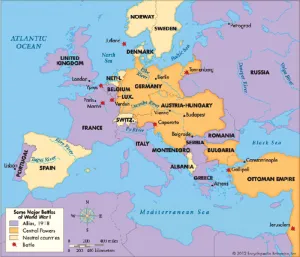
Within a week, Russia, France, Belgium, Great Britain and Serbia had sided against Austria-Hungary and Germany. Soon after, Germany and Austria-Hungary teamed with the Ottoman Empire and Bulgaria and were referred collectively as the Central Powers. Russia, France and Great Britain, the major Allied Powers, eventually were joined by Italy, Japan and Portugal, among other nations.
Why did all these nations go to war against each other? The future king of Austria-Hungary and his wife were assassinated in Bosnia because the annexation of that country had brought anger to the Slavs. There were people living in the next-door nation of Serbia who were against this annexation. But wouldn’t that be a problem for Bosnia, Serbia and Austria-Hungary to settle; not most of Europe?
What did France, Great Britain, Turkey, Germany, Russia Bulgaria, Portugal and all the other nations that fought in this Great War have to do with the assassination? The war was blamed on the treaties that they held with one another. For example: every nation (A) that declared war on nation B, the nations that had signed a treaty with that nation B automatically declared war on nation A. So, we had many nations that joined their partners in this “Great War.” It didn’t matter what was the reason for the war, they automatically declared war.
But it was the three smaller nations of Bosnia, Serbia and Romania that were at the center of hostilities between the four targeted empires, the Ottoman, German, Russian and Austro-Hungarian empires. In these nations the international occult incited political unrest and performed the assassination of one of Austro-Hungary’s royalty, in order to start World War One.
This territory of the three smaller nations had been the battle ground of the Russo-Turkish wars in the previous century, and now they were once again in the war zone for destroying these four world empires. The goal was to replace these four existing continental empires, ruled by monarchies, with four democratically controlled continental unions. The globalists knew that a democracy could be influenced greatly by a controlled media and bribes to its politicians; while a monarchy was much harder to sway.
In addition, there is another reason for the war. The Jews did not have a Jewish-owned central usury bank in either of the empires of Germany, Austria-Hungary, the Ottoman Empire or Russia. The power behind the creation of these wars were the Rothschilds and their Jewish kindred. All four empires lost their monarchies and in return got their Jewish-owned usury central bank which controlled their country. Pretty slick!
The analytical error made by the four targeted empires was to misinterpret the assassination of Austria’s heir to the throne as a tragedy inflicted only by Serbia, instead of realizing that the assassination was an international strategy to instigate a continental war, a Great War, which would destroy the four monarchy-run empires. This was what World War I was about—not as President Wilson said.
AMERICA JOINS THE BATTLE
Eventually, almost three years after it had begun, America joined in the fight. But in the propaganda, Americans were told that the war was not being fought to defend the monarchies of Europe, one of whom had its future king assassinated, but it was being fought “to make the world safe for democracy”. Safe for democracy? That was only partly true. For it was to make the four empires to lose their monarchies and provide for them a country that would be safe for democracy so it would be easier for the four empires to have the Jewish-owned usury central bank in their nation which would put that nation under Jewish control.
Image

And one of the main posters for enlistment into the military had a picture of a drooling, mustachioed ape wielding a club bearing the German word “Kultur” and wearing a pickelhaube helmet with the word “militarism” walking onto the shore of America while holding a half-naked woman in his grasp (possibly meant to depict Liberty). It had the words, “Destroy This Mad Brute. Enlist. U.S. Army.”
Who in their right mind would believe that a German soldier looked and acted like that poster suggested! But many did.
And I thought that our pledge of allegiance said: “I pledge allegiance to the flag of the United States of America, and to the republic [not democracy] for which it stands, one nation under God, indivisible, with liberty and justice for all.”
How did this happen? Was the United States no longer a Republic, and now a democracy? Why do all the television hosts and politicians constantly say that our nation is a democracy?
James Madison, who many call the father of the Constitution, was very skeptical that direct democracy would be a suitable form of government for making informed decisions. Rather, Madison and Alexander Hamilton preferred a rule by experts, elected by the people to act on behalf of them and leave complex policy decisions to them to decide—the essence of representative democracy. A few founding fathers even expressed that a democracy was a rule by the mob.
The United States is the first and only nation ever founded as a Protestant nation. It frowned on any Roman Catholics and Jews being allowed into the country, and if any of these two heretical groups were in the new nation, they would have no part in running it. There were very few of them who were members of the nation in the beginning. It was a Republic, but it didn’t last long. A quick look at who is in our Congress, Supreme Court and Legislative offices will explain everything that is happening in this now Catholic-Jewish nation.
In the beginning years of the United States, only the white man who owned property had the right to vote and hold office. No women, married or single, could vote. No other race could vote. The nation was racist, which means that the nation believed each race possesses certain characteristics, not as the Communists define the word as meaning a person filled with antagonism and hatred for all races except his own, and sexist; and that was good. And, it is a little-known fact, that the United States had a national bank for only 40 of its first 124 years.
Image
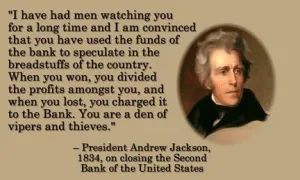
But one of the presidents (the seventh under the Constitution) was against the renewal of the charter of the Second National Bank. He was a Freemason who became the Grand Master of the Grand Lodge of Tennessee. He ran his presidential campaign primarily against that National Bank. He even called the owners and operators of the bank the same words used by our Savior—he called them exactly what they were: “vipers” and “thieves.”
After the national bank was closed, the owners of the bank (Jews) sought their revenge. The Jewish bankers of America and Britain instigated the War between the Two Nations (Civil War), then the Spanish-American War, the first and second World Wars, the Korean War, the Vietnam War, the Desert Storm War, the Ukrainian War, etc. And they eventually set up in the United States another national usury bank, called the Federal Reserve System. Within one year of its existence, World War I began. And most of Europe would be put under the Jewish-owned usury central bank.
MONARCHIES LOSE
Image

At the first World War’s conclusion, democracies sprang up and monarchies (and republics) slowly went out of business. A democracy is the form of government that precedes Communism. There are only a few monarchies that have survived and there is not one monarchy that had the power that it once had.
Image

There were four nations that lost their monarchies at the end of the World War One:
- Austria-Hungary (King Franz Joseph I)
- Germany (Kaiser Wilhelm II),
- Russia (Czar Nicholas II) Sultan Mehmed VI
- Turkey (Sultan Mehmed VI).
Image
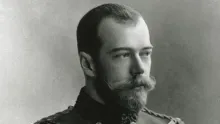
King George V of Britain, Kaiser Wilhelm II of Germany and Czar Nicholas II of Russia were all related by blood because they were cousins. The kings of Britain and Germany along with the wife of Russia’s czar were all grandchildren of Queen Victoria of Great Britain. Queen Victoria was a member of the Saxe-Coburg-Gotha family, who also ruled the nations of Belgium, Portugal and Bulgaria.
A QUICK REVIEW OF THE GERMAN HERITAGE OF THE BRITISH ROYALTY
King George I: Over 300 years ago, on August 1, 1714, England’s Queen Anne died, and the Stuart dynasty ended. As a result of Queen Anne being childless(her five children all died before they reached the age of 11) and her other relatives being Catholic, the German, George Louis of Hanover, was proclaimed king of Great Britain in absentia. He was the only heir to the throne, and the first German to ascend to an English throne.
At the beginning, his British subjects were not amused. The German king did not set foot on English soil until two months after his proclamation and was crowned King George I on October 20, 1714. A divorced man, he publicly flirted with two mistresses. He couldn’t speak any English, just German. But he did bring peace to the two countries—Great Britain and Hanover (Germany)—which provided a new European balance of power that ended decades of war.
King George II: His son George II left the British their national anthem, “God Save The King,” which later became “God Save The Queen.”
King George III: His grandson George III was the first in the line of German kings to be born in England, with English being his first language. He married the Princess Charlotte of Mecklenburg-Strelitz of Germany. The couple had 15 children.
George III was the king of Britain when the Revolutionary War broke out in the American colonies. Britain and France had fought the Seven Years’ War which made England deeply in debt to the Jewish banks. It was reasoned in England that since the colonies benefited from the outcome of the war and British troops were needed in North America to protect them, then the Colonies should pay for it. So, King George III supported the Sugar Act of 1764 and the Stamp Act of 1765. The colonies vehemently disagreed with all these special taxes placed on them.
By 1775, many colonists had had enough of Parliament’s overreach. Inspired by Enlightenment philosophers (putting out anti-Christian views) John Locke, Thomas Paine and Jean Jacques Rousseau, the colonists formed the Second Continental Congress and crafted their sentiments in a Declaration of Independence. Though Parliament conceived and passed the laws, the king was the exclusive target of the colonists’ grievances. The Treaty of Paris in 1783 secured America’s independence.
George III suffered from a metabolic disorder, his health deteriorated, and he became mentally ill. This made the popular monarch, who supported the arts and sciences, increasingly incapable of ruling. He is mostly remembered as “Mad King George.”
King George IV: King George III’s eldest son, Georg August Friedrich, took over during his father’s lifetime as prince regent in 1811 and was crowned King George IV in 1820 — the next king with a predominantly German bloodline.
George IV’s extravagant lifestyle did not endear him to his subjects, and the obese monarch was not mourned much when he died. His eccentricity managed to severely damage the reputation of the royal house. He left behind no political legacy, but a cultural one: Buckingham House was expanded into a palace and a building was erected in the seaside resort of Brighton that is still unique in Europe in terms of opulence — the Royal Pavilion.
Image
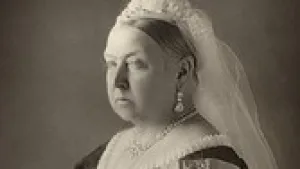
Queen Victoria and Prince Albert: In 1837, George IV’s niece, Victoria, who also had a partly German bloodline, was crowned Queen of England. She married her cousin, the German Prince Albert of Sachsen-Coburg and Gotha. Initially, the British wondered why their queen would choose a provincial German prince, but they soon changed their minds.
Albert allegedly initiated in England the German custom of putting up Christmas trees. He established the first World’s Fair, in London in 1851, while also reforming administration and construction throughout the kingdom.
Thanks to the queen’s consort, the British royal family regained its reputation. A magnificent statue of Albert stands in the center of London and Albert Bridge in London was named after him, as was the famous Royal Albert Hall concert hall.
Meanwhile, Queen Victoria carried out representative functions in addition to her role as mother of nine children. Her influence in foreign policy was primarily grounded in her kinship relations with the leading ruling houses of Europe.
She made sure her children married into other European royal courts. Today her descendants sit on the throne in many European royal houses, including Queen Margrethe of Denmark, Kings Harald V of Norway and Carl XVI Gustaf of Sweden, the former Spanish royal couple Juan Carlos and Sophia — all the way to Elizabeth II, the former British queen; besides the former Royal Houses of Germany, Russia, Bulgaria, Belgium and Portugal.
Victoria was nicknamed the “Grandmother of Europe” and at the time, with 64 years on the throne, she was Britain’s longest-serving monarch. The Victorian era, named after her, saw the growth of the British Empire to a global industrial power, as well as advances in the arts and sciences, along with societal changes. Some 120 years later, her length of rule was surpassed by her great-great-granddaughter, Elizabeth II.
King Edward VII: Queen Victoria died in 1901, succeeded by her eldest son Edward VII, the first English king from the German dynasty of Sachsen-Coburg and Gotha. To make the name easier to pronounce for the English, the house was renamed Saxe-Coburg and Gotha. Nathaniel Rothschild (antichrist) had a very close friendship with the masonic king, who was a thirty-third-degree Mason. The masonic circles formed a special Jewish masonic group which planned, financed, and deployed World War I.
Image

King George V: Just a few years later, in 1910, his son George V became king. He was married to Maria von Teck, who also had German blood, and who became known as Queen Mary.
The reign of George V coincided with World War I, which was waged against his cousin, German Emperor Wilhelm II. In England, attitudes toward all things German changed — as the German Empire was known to be the main aggressor in Britain. Propaganda was used, by the government, to make the Germans (with the royalty in England an exception) unlikeable in England.
Image

Here is a poster used as propaganda by the British against the December 16, 1914 German ship attack against Scarborough, England. The bombardment lasted for half-a-hour and then went on and bombed the small towns of Hartlepool and Whitby.
Image

The bombing by the German navy of the three towns of Scarborough, Whitby and Hartlepool (on the northeast coast of England) caused much criticism of the British navy for allowing this bombing to take place. But nevertheless, Scarborough, a vacation town, was dramatized in the posters against the Germans, calling them “Barbarians”.
Three years after the bombing of Scarborough, in 1917, George V decided to change the German family name to Windsor. George also renounced all German titles, as did his cousin Ludwig von Battenberg, who renamed his family Mountbatten. Queen Elizabeth’s husband, Prince Philip, came from this family.
WHO WAS DETHRONED?
- King Charles 1 & IV was dethroned in Austria-Hungary in 1918 after World War I.
- Emperor Wilhelm II abdicated in 1918 following Germany’s defeat in World War I and fled to the Netherlands.
- Emperor Nicholas II abdicated after the February Revolution of 1917, as he named his successor, his brother Grand Duke Michael. Both Nicholas II and Michael separately were later murdered, as was all of Nicolas II’s immediate family in 1918. The monarchy was abolished and replaced by a Provisional Government which was in turn overthrown months later by Lenin, which would by 1922 named Russia the Soviet Union.
- And Sultan Mehmed VI of Turkey was deposed following the collapse of the Ottoman Empire in 1922.
WHY DID THE UNITED STATES CHANGE ITS MIND?
On August 4, 1914 as World War I erupted across Europe, President Woodrow Wilson proclaimed America’s neutrality, stating the nation “must be neutral in fact as well as in name during these days that are to try men’s souls.”With no vital interests at stake, many Americans supported this position. Additionally, America was home to several, some rather large, groups of immigrants from countries at war with each other and Wilson wanted to avoid this becoming a divisive issue.
American companies, however, continued to ship food, raw materials and munitions to both the Allies and Central Powers, although trade between the Central Powers and the United States was severely curtailed by Britain’s naval blockade of Germany. United States banks (Jewish owned) also provided the warring nations with loans, the bulk of which went to the Allies.
On May 7, 1915, a German submarine sank the British ocean liner Lusitania, resulting in the deaths of nearly 1,200 people, including 128 Americans. The incident strained diplomatic relations between Washington and Berlin and helped turn public opinion against Germany.
President Wilson demanded that the Germans stop unannounced submarine warfare, however, he didn’t believe the United States should take military action against Germany. Some Americans disagreed with this nonintervention policy, including former president Theodore Roosevelt (Jew), who criticized President Wilson and advocated going to war. Roosevelt promoted the Preparedness Movement; whose aim was to persuade the nation it must get ready for war.
And then there was the Zimmermann telegram. That occurred in January 1917. The British intercepted and deciphered an encrypted message from German Foreign Minister Arthur Zimmermann to the German minister in Mexico, Heinrich von Eckhart.
The Zimmermann telegram proposed an alliance between Germany and Mexico—America’s southern neighbor—if America joined the war on the side of the Allies. As part of the arrangement, the Germans would support the Mexicans in regaining the territory they’d lost in the Mexican-American War—Texas, New Mexico and Arizona. Additionally, Germany wanted Mexico to help convince Japan to come over to its side in the conflict.
This provided President Wilson some reasons to lead the United States into joining the war. But none of these were the real reason. It was falsely called a war to save the world for democracies. The real reason, like all wars, is hidden behind the actions of the wizard behind the screen.
THE JEWISH CABAL BECOMES THE MOST POWERFUL
The International Jewish Cabal, by the twentieth century, had become more successful than the Royalty, the Papacy, and the Occult. The Jewish Cabal’s power over finance (through usury) and control of the media, became more influential than anything the other major powers could display. The Cabal financially supports politicians and the media, but also initiates financial persecutions of businesses or persons exposing them. It is still true today.
The International Jewish Cabal, though very anti-Christian, maintained a Biblical front to deceive naïve Christian circles, claiming themselves to be “God’s Chosen People” and “Masters of the Old Testament.”
The Christians who accepted the erroneous Kenite-Canaanite-Edomite-Ashkenazi (like John Hagee) interpretations refer to themselves as Judeo-Christians, or Jewish-Christians. For they believe that Jesus Christ was a Jew, the Apostles were Jews, the first Christian church was made up of all Jews, so, the Christian Church owes its existence to the Jews. Without the Jews there would be no Christian Church, is what these apostate Christians say.
The Judeo-Christians fear that if they challenge the morality of the actions of the Jewish Cabal, they will be labeled antisemitic. Anyone who challenges the actions of the Jewish Cabal should be labeled as “anticain” for the Jews are not descended from Shem but from Cain, Canaan, and Esau; the enemies of God.
Can anyone disagree on the previous two paragraphs? Are all Judeo-Christian churches pro-Zionists? Or pro-Jewish? Are both political parties, Democrat and Republican pro-Jewish? How well was the phrase “With Jews, we lose!” received? Are the Jews a people with no mistakes? No Jew has ever in the past, present or future ever been changed from a child of the devil to a child of God.
THE JEWS DESIRED REVENGE
As the Jewish Rothschild’s banks gained economic supremacy in Europe, they helped finance (by charging usury) the destruction of France in the French Revolution. The Jewish Cabal wanted revenge for something. What was it?
After King Louis IX’s death, the King of France became a saint in the Roman Catholic Church. He is commonly known as Saint Louis who began to rule France at the age of 12. His reign was from 1226 till 1270 (44 years). The city of St. Louis, Missouri is named after him.
St. Louis, Missouri was founded in 1764 as a French fur-trading village by Pierre Laclede. He named the city “St. Louis” for King “Louis” IX, the crusader king who was the patron saint of France’s ruler King Louis XV. St. Louis was part of the Louisiana Purchase that wasn’t sold to America until Napoleon got rid of it in 1803. He exchanged the vast territory in order to raise money to fight his own wars in Europe.
But after the death of George Floyd in 2020, who would have died within the night if he would have been alone; but nevertheless the Communists had their regular order of operations, which meant riots in the street and the calling for the taking down of statues of explorers and Confederates. But have you heard of this one? One group of people are fighting a battle in St. Louis to take down the statue of King Louis IX. But that’s not all. They want the entire city of St. Louis to be renamed. Why?
Image

As previously stated, in 1764, after receiving a land grant from the King of France, the current site of the fur trading post was named St. Louis by two French settlers. They agreed on the name because it was named after one of the most famous Frenchmen of all time.
What is wrong with naming a city after one of the most famous of all people in the nation’s history? During King Louis IX’s reign, he led the seventh and eighth crusades and became one of the most popular kings in French history. He also championed many peaceful and administrative reforms across Europe and was beloved by the people of France. Upon his death, Louis IX became the only king of France to ever be canonized as a saint by the Catholic Church.
At the time the name was chosen for this future city, King Louis IX was as notable a figure in French culture as George Washington is in American culture. In the United States we have one state, 94 towns, many cities, including our capital city, multitudes of counties and townships, numerous schools and colleges are named after him. In fact, Washington is the one person in the United States that has more places named after him than any other. But activists now agree that both George Washington and King Louis IX don’t fall in line with modern values. For example, they say that Washington was a slave holder and Louis IX was problematic with his views on the Jewish religion.
Architectural historian Michael Allen is quoted as saying:
“To many people of Jewish heritage, he [King Louis IX] is known as someone who persecuted the Jewish people of France, confiscated and burned the Talmud, and 665 years before Adolf Hitler became chancellor of Germany he required Jewish people to wear an identification badge in public.”
The thirteenth century was a tumultuous time for the Jewish people in France. There were four prominent French rabbis who were chosen to defend the Talmud against one converted Jew who became a Catholic who wrote a letter to the Pope telling him about the dangers of the Talmud. He informed the Pope that the Talmud told 35 falsehoods against the Catholic church. He was the other debater.
The trial went on for several days. This former Jew turned Catholic had testified that the Talmud said terrible things about:
- Mary, the mother of Jesus,
- Jesus the Christ,
- The Catholic Church,
- Christians,
- Etc.
The trial proved that the Talmud was a human creation that contained blasphemous and anti-Christian teachings. Since the charges were proved true, the accusations justified banning the Talmud—a major blow to Jewish religious practice.
New regulations first limited the Jews’ ability to charge usury on loans and take pledges, and later forbade Jews from lending usury at all. Jewish migration was limited, while heavy taxes sapped the wealth of Jews. Accusations of ritual murder, confirmed by confessions made by some of the participants, undermined the safety and security of the Jewish population. Jews were forced to wear distinctive badges and forbidden to build new cemeteries or synagogues, or even repair old ones.
King Louis IX was lauded for his persecution of the Jews as part of his ideal Christian kingship. The anti-Jewish policies encouraged by the king, made it harder than ever to live in France as a Jew. Shortly, thereafter, the Jews were expelled from France in 1306.
King Louis IX oversaw the “sentence” of the Talmud trial two years later, in 1242. Why was it two years? Because the decision of the trial had been delayed because it was not a unanimous decision. Gauthier Cornut, the aged Archbishop of Sens, made a strong dissent. He was the highest-ranking churchman present, his word carried weight and he had on previous occasions displayed sympathy for the Jews. So, for two years, from 1240 to 1242, the Archbishop prevented any violent action against the Talmud. But shortly after his death, the Talmud was prepared to be burnt in Paris.
The Jews remained mostly hidden, in deepest mourning, terrified to venture on the streets of Paris on most days. I wonder if their god was in the bottomless pit or was out roaming the earth or was, as the dispensationalists teach, not to go in the prison until close to eight hundred years from this date of their humiliation in France.
Officials throughout France had scoured the countryside looking for copies of the Talmud and other Jewish books, taking them by force, if necessary, from Jews across France. On the morning, it was seven hundred eighty-one years ago yesterday, on June 17, 1242, twenty-four wagons were piled to the top with about 10,000 volumes of the Talmud and other Jewish blasphemous books. The carts made their way slowly through Paris near Notre Dame Cathedral. The collection was enormous. At a time when every book was painstakingly written by hand, this represented generations of Jewish learning and work.
One by one, each of the two dozen wagons were emptied of their books by putting them in a very large pile on the ground. It took practically all day. And then the books were set on fire as the smoke filled the sky. What a gigantic fire that was!
Image
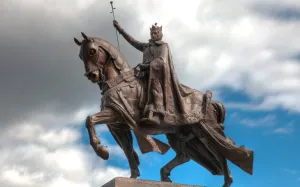
What is the position of today’s Roman Catholic? Do they agree with what Saint Louis did? Your church made him a saint…do you disagree with this? What is the position of today’s Judeo-Christians? Are they in agreement with the policies of Saint Louis? Did Louis IX believe that the Jews were friendly to the church or did he believe that they had very hateful things that their “holy book” said about Jesus the Christ, His mother, His followers, etc.
CONCLUSION
If you were living in France at the time of the burning of the Talmud and all the other restrictions made against the Jews, would you agree with or would you be against the actions which they brought to pass? Don’t you think King Louis IX acted a lot like Adolph Hitler did six centuries later? Maybe he was a little bit worse. And what about Martin Luther at the end of his life? King Louis IX set the table for the expulsion of all Jews from his nation, exactly what Martin Luther warned the leaders to do centuries later.
Did you note that the architecture historian, who was not a theologian, who was quoted previously, gave no reason for King Louis IX views on why he did what he did to the Jewish people and their religion? He didn’t just burn their Talmud and other religious books with no justification. He conducted a trial and the Talmud was found guilty. He didn’t just expel the believers in the Talmud from his country with no reason. He presented the reasons. He didn’t just have them wear identification badges for just something to do. He had very good reasons. It comes from the harm the Jews constantly gave to the nation of France and from the warnings from the Bible.
The Jews don’t understand forgiveness; they always want vengeance. For the first time in a thousand years, the French people were not ruled by a monarch when King Louis XVI was guillotined in January 21, 1793. It was considered revenge by the Jews since it was 551 years since King Louis IX had the Talmud trial and as a result the Talmud was burned in Paris.
It was in the same time frame, 1307-1314, that King Philip IV captured and dissolved the Knights Templars for their occult activities. The Templars were also avenged in the French Revolution when their successors, the occult Jacobins, beheaded King Louis XVI.
The revenge of World War I was against Christianity. The Zionists were closer than ever to their goal of a world government. World government was born, weak but alive. They needed to destroy both Christianity’s spiritual teachings and its civilization. To gain the financial control of these nations, they had to have their central bank dominating in their nations. Once they had the central bank, they began like they did in the United States by:
- Setting up public schools. “There is no God and no soul. Hence, there is no need for the props of traditional religion” --John Dewey, father of American education;
- Promoting of the infiltration of all social institutions, including churches. This was what Saul Alinsky (Jew), whose students included Hillary Clinton and Barack Obama, said that America needed a change by instilling class envy, race-baiting, and anti-Christian bigotry and promoting the redistribution of wealth.
- Promoting Planned Parenthood. This was promoted by the Jew Margaret Sanger, who denounced marriage as a “degenerate institution” and who also said, “No gods, no masters.” Roughly, 3,000 babies are aborted each day in the United States and to a large degree, this is due to Margaret Sanger’s life.
Was Satan locked up in the bottomless pit for a sentence of one thousand years during the reign of King Louis IX? or
Was Satan let out of prison after serving his time in the bottomless pit and was now deceiving the nations? or
Is Satan to be bound in the pit for a thousand years still in the future?
To be continued.
Blessed be the LORD God of Israel.












